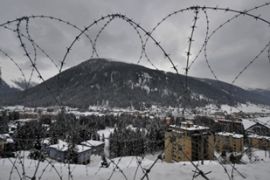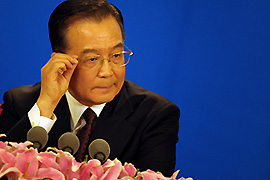Financial crisis hangs over Davos
Meeting comes as IMF says world growth to fall to lowest rate since World War II.

| In depth | ||||||||

Focus
Videos
|
Twenty-one per cent of respondents said they were very confident of growing revenue in the next 12 months, down from 50 per cent a year ago, the survey suggested.
The dismal economic forecasts have put a damper on the normally glitzy start of the annual four-day economic summit.
The financial crisis has also meant that politicians are taking centre-stage at the summit over the rich bankers and other financial heavyweights who normally run the show.
More than 70,000 job cuts were announced on Monday this week alone and world leaders are hoping to find ways out of recession.
Murdoch’s views
Arriving in Davos on Wednesday, Rupert Murdoch, the chairman of News Corp, a media conglomerate, said the economic crisis was deepening.
“It’s going to take drastic action to turn it around, if it can be turned around quickly. Personally, I believe it will take some time,” he said.
| Absent from Davos |
|
Some of the world’s most powerful bankers – taking the blame for the global economic crisis – have skipped this year’s summit:
|
“The great majority of the people in the world are depressed and traumatised by the fact that their savings, the wealth in their homes or pension funds … a big percentage of it has disappeared.”
Trevor Manuel, South Africa’s finance minister, said there was a risk developed nations would emerge from the crisis with massive debts.
He said wealthy nations appeared to be adopting a “lemming-like approach, trying to get to the precipice without knowing what their money would buy”.
Wen Jiabao, the Chinese prime minister, said in a speech to the forum that the global economic crisis was having a “big impact” on his country’s economy and posed “major challenges”.
Wen called on rich countries to “assume their responsibilities” and minimise the impact of the financial crisis on developing countries.
He said: “When governments fufil their responsibilities with resolution and courage they can help maintain a stable financial order and prevent the crisis from causing more serious damage on the world economy.
“Political leaders must be forward-looking. They should be responsible to the entire financial community as well as to their own countries and people”.
China has sent one of its biggest-ever delegations to the forum, which some analysts interpreted as a sign of Beijing’s desire to engage with the rest of the world in finding a way out of the crisis.
‘Perfect storm’
Officially opening the summit, Vladimir Putin, the Russian prime minister, called the international economic crisis the “perfect storm”.
He said: “There is the notion of the ‘perfect storm’ when the natural elements come to a point and multiply their destructive capacity. This crisis looks exactly like this perfect storm.”
 |
| Wen called on rich countries to ‘assume their responsibilities’ [AFP] |
Notably absent from the summit was a senior delegation from the United States, despite hopes that the new administration of Barack Obama will be able to lead a recovery.
Speaking to Al Jazeera, Lionel Barber, the editor of London’s Financial Times newspaper, said economies should be looking to the US for a way out of the crisis.
Barber said: “America is spending too much and China is saving too little, so we need to get the economies back in balance and the key players are America and China.
“The biggest myth in this story was that, somehow, the rest of the world could decouple from the American economy, that they were strong enough … to stand on their own two feet.”
But Barber said this was wrong “because they depend on American growth, American markets”.
“So all eyes I’m afraid, even though they are on Davos this week, should be on Washington,” he said.
